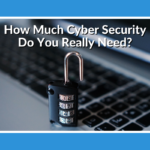
Have you ever had a car (that was so old and so worthless) that you were tempted to leave the keys in the ignition so that it would get stolen? On the flip side, if you have a nice car, you’re going to hang onto those keys, aren’t you? Well, in both the real world and the online world, there are people who would take your hard-earned money and belongings. Some of them may even try to talk you into handing them your keys. That’s why it’s so important to be cyber security savvy.
How savvy you need to be about cyber security is going to depend on a lot of factors.
For example, if you’re Ron Swanson from Parks and Rec, you’re probably appalled that your name is even appearing online. That’s assuming any of your coworkers even tells you, though, because your goal is to stay off the internet altogether.
On the other hand, if you’re a normal human being, you’ve got online bank access, at least one email address (probably several!), and all sorts of social media accounts. What’s at stake? Your identity. And if it’s your business, then that’s at stake, too.
So let’s go over some of the cyber security buzzwords – and what you can do to be safe online.
First off, start by using a strong password. Oh, and don’t use “password” – that’s one of the first things hackers try. Use something you’ll remember that’s hard to guess – and throw in memorable symbols, numbers, and vary between upper and lower case.
Here’s what we’ve seen some tinfoil hat types recommend: use the first (or third) letter in every word from a favorite song’s refrain. It’s random, easy (okay, easier!) to remember, and unique. Or, set up some kind of password scheme that keeps each password unique but easy to remember.
Ever been prompted to set up a security question or a two-step authorization? Yeah, go ahead and set those up. If someone is able to hack your username and password, they’ll get stuck right there – without being able to access your account.
Set up alerts. Many financial institutions offer text, email, or even app notifications. Some let you set it up for suspicious charges – or even every charge. But having that notification could be the difference between a small bump in the road – or a huge hassle.
Use secure networks. If you look at the beginning of a URL, it should have a locked padlock symbol and start with https://. If it doesn’t have that s on the end, it’s not secure. In other words, if you’re on a public WiFi or hot spot, that’s not a safe site to browse. Stick to safe, secure websites that use https://.
There’s an awful lot of scams out there to avoid. The best way to spot a scam? If it’s too good to be true, it probably is a scam. So if some long-lost prince asks to send you several million dollars to keep safe from his maniacal step-parent, don’t give out your information.
Here are some of common types of cyber scams to watch out for:
The online world is an amazing resource – as long as you’re smart about it. Surf the web responsibly and stay safe out there, friends.
XBLUE Cloud Service Terms of Use | Telephone Line Service Terms of Use
VoIP Services Acceptable Use Policy – AUP | This Site Uses Cookies – See Our Privacy Policy
© 2006-2024 XBLUE Networks, LLC. All Rights Reserved
•••••••